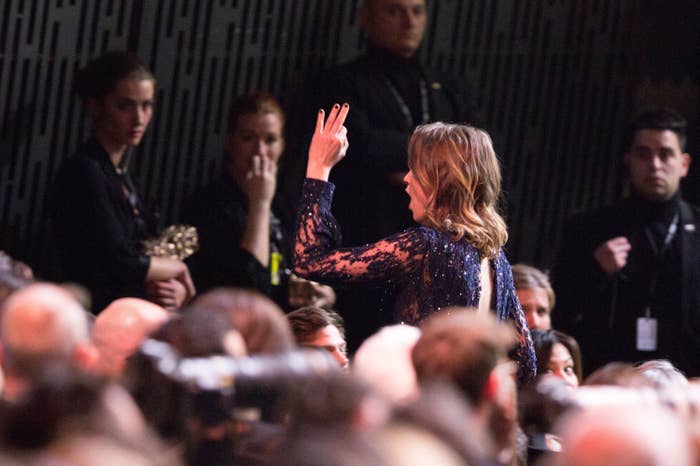Walkouts as Roman Polanski wins best director at French Oscars

AFP / Bertrand GUAY
Adele Haenel (R), who has become a hero of the #MeToo
movement in France, stormed out when Roman Polanski
won best director at the French Oscars
Roman Polanski won best director for "An Officer and a Spy" at a fractious ceremony for the French Oscars, the Cesars, that ended in walkouts and recrimination in Paris early Saturday.
The entire French academy had been forced to resign earlier this month amid fury that the veteran -- wanted in the US for the statutory rape of a 13-year-old girl in 1977 -- had topped the list of nominations.
Protesters chanting "Lock up Polanski!" tried to storm the theatre where the ceremony was being held before being pushed back by police firing tear gas.
And France's Culture Minister Franck Riester had warned that giving the maker of "Rosemary's Baby" a Cesar would be "symbolically bad given the stance we must take against sexual and sexist violence".

AFP / Lucas BARIOULET
Protesters chanting 'Lock up Polanski!' tried to storm the
theatre where the ceremony was being held
But Polanski won two awards, best adapted screenplay and best director -- with the latter prompting Adele Haenel, who was nominated for best actress for "Portrait of a Lady on Fire", to storm out, crying "Shame!"
Haenel has become a hero of the #MeToo movement in France after accusing the director of her first film, Christophe Ruggia, of sexually harassing her when she was only 12.
Polanski's film also picked up best costume design.
- 'Public lynching' -
"Distinguishing Polanski is spitting in the face of all victims," Haenel had said in the run-up to the Cesars.
"It means raping women isn't that bad."

AFP/File / Lou BENOIST
Polanski on the red carpet at the ville US Film Festival in
northern France last September
Polanski, 86, and the entire team of his historical drama had boycotted the ceremony, fearing a "public lynching".
"An Officer and a Spy" is based on the Dreyfus affair which divided France in the late 19th century when a Jewish army officer was wrongly prosecuted for spying.
"What place can there be in such deplorable conditions for a film about the defence of truth, the fight for justice, (against) blind hate and anti-Semitism?" the director told AFP.
Polanski's epic, which won two top prizes at the Venice film festival last year, was in the running in 12 categories at the Cesars.

AFP / Bertrand GUAY
But the big winner on the night was the Oscar-nominated "Les Miserables", set in one of France's deprived and restive suburbs.
It took best film and three other prizes including the audience award.
It's Mali-born director Ladj Ly made an appeal for unity on a highly fraught night, saying "our enemy is not the other, but poverty".
- Poisonous atmosphere -
"Papicha", a touching story of Algerian women fighting for their freedom by Mounia Meddour, also fared well, winning both best first film and best female newcomer for actress Lyna Khoudri.
With the French film industry at war with itself over Polanski, Hollywood star Brad Pitt also snubbed the event having reportedly been offered an honorary award.

AFP / BERTRAND GUAY
Posters with a play on words combining the word rape in French
with the name of Polish-French filmmaker Roman Polanski,
and reading "Violanski, the Cesars of shame" plastered on
the headquarters of the French film academy ahead of its 'Cesar' award
The French press had dubbed the event "The Cesars of Anguish", with Le Parisien daily mocking up a movie poster of Hitchcock's "Vertigo".
And the ceremony lived up to its billing.
The poisonous atmosphere had already worsened on the eve of the awards when 30 film figures from minority backgrounds lashed the lip service they claimed the industry plays to inclusion.
- Casual racism -
In blistering open letter they said black, North African and Asian-origin performers are mostly confined to stereotypical bit parts in French films.
On the night, one of the signatories of the letter, actress Aissa Maiga, delivering a scathing critique of casual racism in the industry as she presented the prize for best newcomer, including skewering presenter Florence Foresti for once donning blackface.
But it was the absent figure of Polanski which caused most unease, with a presenter only daring to mumble his name when he opened the envelope for his first win.

AFP / Bertrand GUAY
'Papicha', a touching story of Algerian women fighting for
their freedom by Mounia Meddour, also fared well
The publicity campaign for Polanski's movie was halted last year after another woman, photographer Valentine Monnier, claimed that she had also been raped by the director in 1975.
But that did not stop it becoming a box office hit in France.
Polanski had told AFP that he had decided to stay away from the ceremony to protect his family and his team from abuse.
"The activists brandish the figure of 12 women who I am supposed to have molested half a century ago," he said.
"These fantasies of sick minds are treated as established fact," he complained.
Polanski snubs French Oscars fearing 'lynching'

AFP/File / Thomas SAMSONFrench-Polish director Roman
Polanski is wanted in the US for the statutory rape of a 13-year-old girl in 1977
Controversial film director Roman Polanski told AFP on Thursday he will not attend the French Oscars because he fears a "public lynching" by feminist activists.
The veteran is at the centre of a storm of protest after his new film about the Dreyfus affair, "An Officer and a Spy", topped the list of nominations for the Cesar awards, which will be presented in Paris on Friday night.
France's equality minister and feminists were outraged at his 12 nominations, including for best film, given that Polanski is still wanted in the United States for the statutory rape of a 13-year-old girl in 1977.
"We know how this evening will unfold already," Polanski said in a statement to AFP as posters appeared at the theatre that will host the ceremony condemning him as a rapist and sex criminal.
"Activists are already threatening me with a public lynching, with some saying they are going to protest outside," the 87-year-old added.
"What place can there be in such deplorable conditions for a film about the defence of truth, the fight for justice, blind hate and anti-Semitism?"
Earlier this week, French star Adele Haenel, who last year accused the director of her first film of sexually harassing her when she was only 12, blasted the Cesars for honouring Polanski.
"Distinguishing Polanski is spitting in the face of all victims," she said. "It means raping women isn't that bad."
The entire board of the French film academy which awards the Cesars was forced to resign early this month after Polanski's movie became the favourite to lift the top prizes.
- 'Sick minds' -
Academy head Alain Terzian had justified its choice by saying that the academy "should not take moral positions" about giving awards.
Despite protests outside some cinemas, the movie -- about Alfred Dreyfus, a Jewish officer wrongly persecuted by the French army at the turn of the 20th century -- has been a French box office hit.
However, even before it opened the publicity campaign for the film was halted after French photographer Valentine Monnier claimed that she had also been raped by the director in 1975.

AFP/File / Christophe ARCHAMBAULT
The publicity campaign for the film was halted after a French
photographer claimed that she had also been raped by the director in 1975
Monnier, an 18-year-old model and actress at the time, said Polanski tried to give her a pill as he beat her "into submission" at his Swiss chalet.
Polanski "absolutely denied" the allegations, pouring scorn on her story.
The director told AFP that he had taken the decision not to attend the Cesars ceremony to protect his team and "my family, my wife and my children, who have been subject to insults and affronts as part of a kind of collective responsibility that comes from another age".
"The activists brandish the figure of 12 women who I am supposed to have molested half a century ago," he added.
"These fantasies of sick minds are treated as established fact -- a lie repeated 1,000 times becomes a truth."
- No fix -
Polanski said that he would not submit himself to a trial by media so "that the irrational triumphs yet again".
And he hit out at those who claimed that "our 12 nominations were a present from the academy management... brushing aside the secret vote of 4,313 professionals who alone decide the nominations as well as the more than 1.5 million people who have gone to see the film" in France.
The director caused uproar at the Venice film festival last year -- where his film won two prizes -- by likening his hounding by the media to the anti-Semitic persecution Dreyfus suffered.
He later blamed the disgraced Hollywood mogul Harvey Weinstein for his woes.
He said Weinstein had tried to brand him a "child rapist" to stop him winning an Oscar in 2003 for "The Pianist".
"Portrait Of A Lady On Fire" Actor Adèle Haenel Stormed Out Of An Awards Ceremony After Roman Polanski Won
"Bravo, pedophelia!" the actor yelled after walking out of the French César awards. Polanski is a convicted child rapist.
Salvador Hernandez BuzzFeed News Reporter
Posted on February 29, 2020
 Abaca Press / Sipa USA via AP
Abaca Press / Sipa USA via AP
Actor Adèle Haenel walked out in protest of the César awards — France's equivalent of the Oscars — after Roman Polanski won best director for his film An Officer And A Spy.
"Bravo, pedophelia!" Haenel, who starred in the film Portrait Of A Lady On Fire, was then heard saying in the lobby of the Salle Pleyel, where the awards show was held.
Polanski was convicted of raping a 13-year-old girl but fled the US in 1978 before he could be sentenced. He has been living in exile since.

Mona Eltahawy@monaeltahawy
“Bravo, pedophilia!” Adèle Haenel, star of Portrait of a Lady on Fire, and the film’s director Céline Sciamma walking out after child rapist Roman #Polanski won the best director award at the Césars, #France’s equivalent to the Oscars. h/t @alucarda01:59 PM - 29 Feb 2020
Reply Retweet Favorite
The director has continued working during his exile, but his nomination sparked outrage in France's film industry, leading to the 21 members of the César Academy to resign and the replacement of its president, Variety reported.
Several other people could be seen walking out of the 45th annual awards ceremony Friday night after Polanski won, including Portrait Of A Lady On Fire director Celine Sciamma.

CANAL+@canalplus
A l'annonce du César de la Meilleure Réalisation pour Roman Polanski ("J'accuse"), Adèle Haenel quitte la salle. Le meilleur des #César2020 > https://t.co/ipnVwouBeV11:22 PM - 28 Feb 2020
Reply Retweet Favorite
Outside the concert hall, demonstrators protested Polanski's nomination, clashing with police.
Neither Polanski nor the crew of the film attended the ceremony. Alain Goldman, who produced An Officer And A Spy, said the cast and team of the film would not attend the show because of, "an escalation of inappropriate and violent language and behavior," according to Variety.
Polanski previously said he would not attend the awards show to avoid a "public lynching."

Abaca Press / Sipa USA via AP
Haenel has been a leading advocate for what has become France's own #MeToo movement. In November, she accused French director, Christophe Ruggia, of sexually harassing her for years beginning when she was 12 years old
The accusation prompted French authorities to launch an investigation. Ruggia now faces sexual aggression charges.
Despite the protests and the controversy prompted by his film, Polanski still faced some support from colleagues in the industry.
French actress Brigitte Bardot posted a handwritten note of support for the director.
"I judge him on his talent and not on his private life!" she wrote. "I regret never having shot with him!"
Haenel was not the only celebrity to protest Polanski's win. French comedian and host of the Césars, Florence Foresti, who opened the ceremony by calling out "predators," did not return to the stage after Polanski's win.
Shortly after the ceremony, she posted a single word to her Instagram story: "Disgusted."

Screenshot
Salvador Hernandez is a reporter for BuzzFeed News and is based in Los Angeles.
























